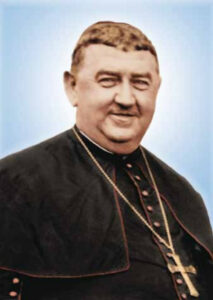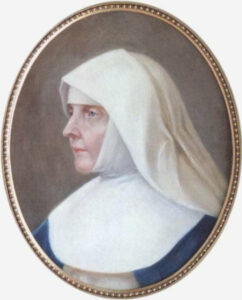January Saints

4 January
Blessed Emmanuel Gonzales Garcia
(1877-1940)
Manuel González García was born in Seville, Spain. In his childhood he joined the church choir and enlisted in the seminary of Seville at the age of twelve for studies for the priesthood. A priest was all he ever wished to be. He excelled in all his studies, earning doctorates in both theology and canon law.
He was ordained to the priesthood in 1901. It was during his first Mass that he entrusted himself to the intercession of Mary, Help of Christians.
In 1902, having been sent to preach a mission in a parish, Emmanuel found the church to be unclean and abandoned. He knelt before the tabernacle and decided then and there to dedicate himself to Eucharistic works in praise of Jesus Christ. He was appointed parish priest of San Pedro de Huelva in 1902. Here, he paid careful attention to disadvantaged people and promoted schools devoted to assisting them as well as being concerned with the working class, providing food for children in need.
In 1910, he established the Disciples of Saint John, who were to be devoted to the Eucharist and to Saint John. Pope Pius X expressed interest in this new group’s work.
Pope Benedict XV appointed him to be the Auxiliary Bishop of Malaga in 1915, followed by an appointment as the Bishop of Málaga in 1920, a position which he held until appointed Bishop of Palencia in 1935. He received the gratitude and the affection of all, including King Alfonso XIII. In Palencia, he founded the Eucharistic Missionaries of Nazareth and also the Children of Reparation, as well as the Disciples of Saint John.
During 1939, because of ill health, he was transferred to Madrid for treatment. He died in 1940 in a clinic in Zaragossa. His final wish: "I ask to be buried next to a tabernacle, so that my bones, after death, as my tongue and my pen in life, are saying to those who pass, ‘There is Jesus! There He is! Do not leave Him abandoned!’ "
Blessed Emmanuel, help us to grow in our love for the Eucharist

5 January
Blessed Maria Marcelina Darowska
(1827-1911)
Marcelina Kotowicz was born in Szulaki, Poland, of wealthy land owner parents. She attended a school in Odessa for three years, before working on her father's farm.
She was deeply religious, even from a young age. Before his death, her father made her promise that she would marry and start a family. And on 2 October 1849 she married Karol Darowski, a land owner from Podolia. He died of typhus three years later, leaving her with two children, Jozef and Karolina. A year after that, her son died. This series of tragedies influenced her religious thoughts. She claimed that she no longer belonged to any earthly being, but rather to God alone.
For health reasons she travelled to Berlin, then to Paris, and finally to Rome, arriving there on 11 April 1853.
In Rome she met Father Hieronim Kajsiewicz, a Resurrectionist priest, who became her spiritual director. On 12 May 1854 she made her vows of chastity and obedience before him. Kajsiewicz introduced her to a nun, Józefa Karska, who became a close friend. Whilst in Poland, the two women decided to found a religious community dedicated to the education and support of women. This new organisation, the Congregation of the Sisters of the Immaculate Conception of the Blessed Virgin Mary, was established in Rome in 1857.
When Karska died from typhus in 1860, Darowska became the Superior of the congregation. In 1863 she moved the community to Jazłowiec, in the Archdiocese of Lviv. She opened a convent and a middle school for girls in the donated ruins of the local castle. This soon became an important spiritual and cultural centre.
In 1863 the congregation received a decree of praise from the Pope, in 1874 the final approval was confirmed, and in 1889 the constitutions were accepted.
During her 50 years' activity as superior of the congregation, Darowska opened many pre-schools and schools in rural areas. She died on 5 January 1911 in Jazłowiec, aged 83. She left seven convents with 350 sisters.
Blessed Maria, when we strike tragedy in our lives, inspire us to hold on to our faith.
 Entries(RSS)
Entries(RSS)